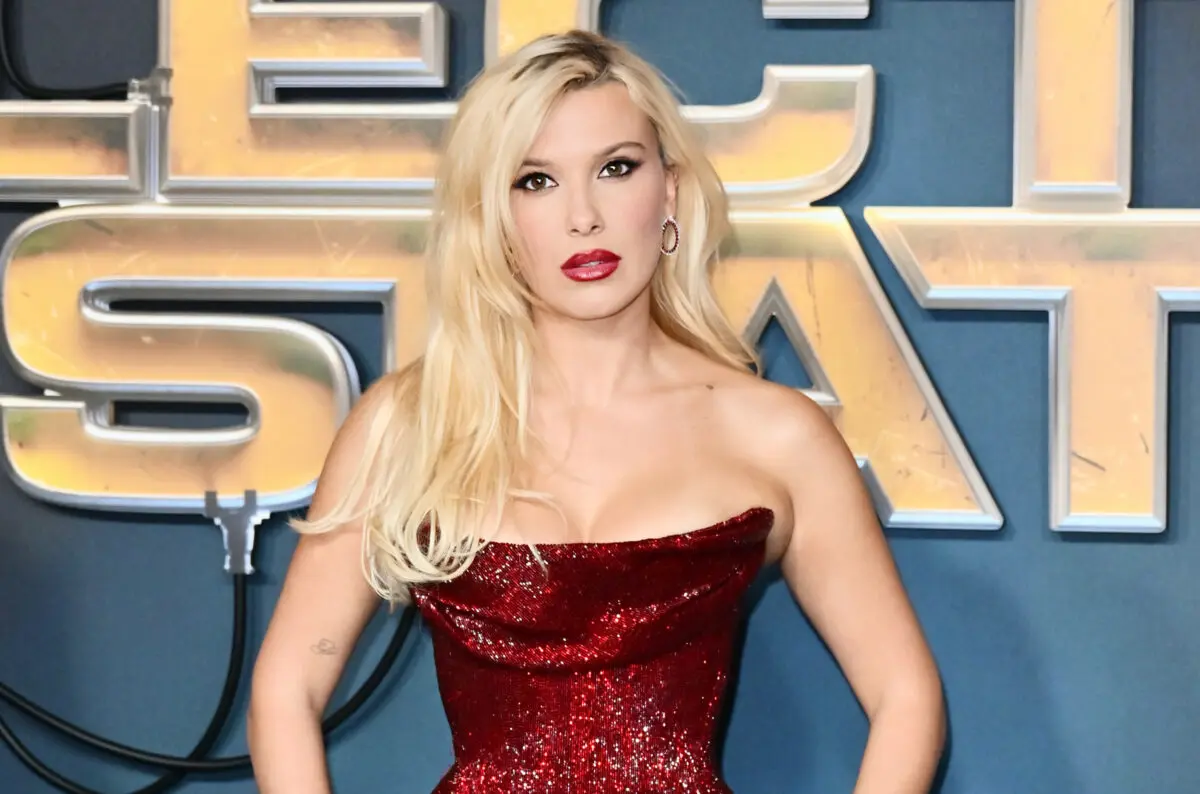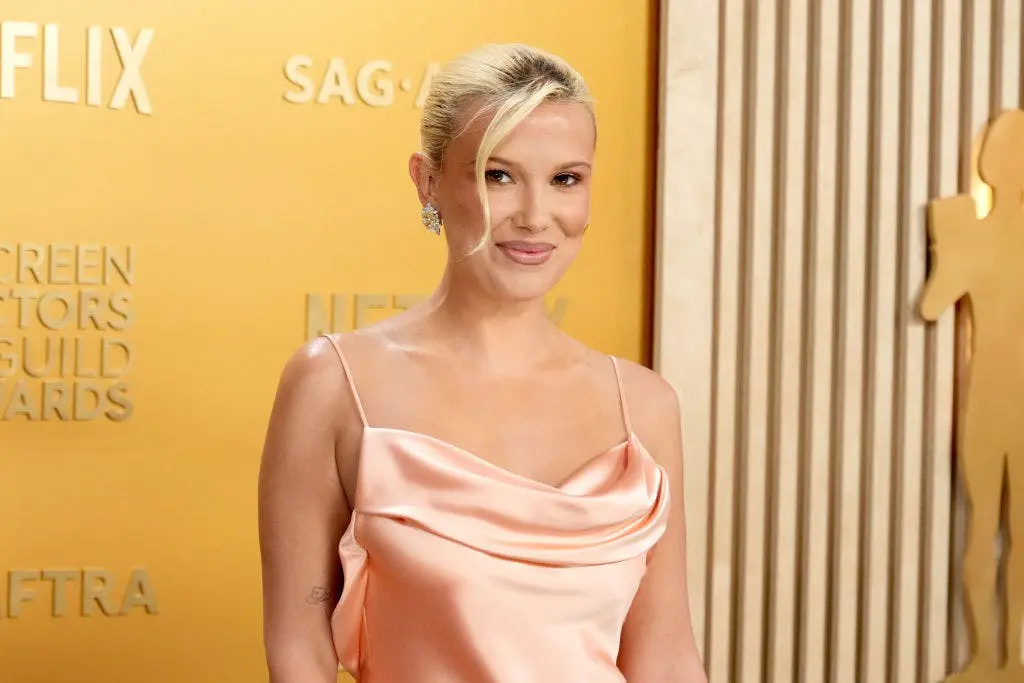In a world where stars continuously redefine the boundaries of beauty and self-expression, Millie Bobby Brown stands at the forefront with her latest transformation. The “Stranger Things” actress, who has captivated audiences since her debut, recently made headlines by trading her iconic platinum blonde hair for her natural deep brunette hue. This change has not only sparked discussions about personal choice and societal expectations but also served as a reminder of the personal journeys that public figures often navigate.
On a vibrant Thursday afternoon during the semi-finals of the Miami Open, held at the illustrious Hard Rock Stadium, Brown made a stunning appearance alongside her husband, Jake Bongiovi, and his rock star father, Jon Bon Jovi. Her choice of hair styling was equally impressive, as she showcased a sleek, low bun secured with a notable red ruffled hair clip, paired with glistening gold hoop earrings and fashionable pastel pink sunglasses.
Emotional weights of beauty standards in the limelight
The glitz and glamor that come with fame often place immense pressure on young actors like Millie Bobby Brown. As she shared with her audience, the scrutiny of public perception can weigh heavily on a person’s mental well-being. After recently debuting a bold platinum blonde look, aimed to reflect a transformative phase in her life, the backlash on social media was immediate. Critics targeted her appearance during the premiere of “The Electric State,” likening her messy updo to Pamela Anderson’s signature style but ultimately suggesting she appeared older than her years. Such harsh commentary can be disheartening, especially for someone who grew up in the spotlight.
The actress responded to the criticism with an empowering statement on her social media. “I refuse to apologize for growing up. I refuse to make myself smaller to fit the unrealistic expectations of people who can’t handle seeing a girl become a woman,” she articulated. These words resonate deeply in an industry that is infamous for its unrealistic beauty standards.
The influence of social media cannot be understated, and in the age of constant online connectivity, celebrities are more vulnerable to public scrutiny than ever before. Brown’s challenges exemplify broader societal issues surrounding ageism and body shaming, particularly for women. It raises questions: Why do we hold public figures to standards that we often do not apply to ourselves? And how do we navigate the dichotomy of public admiration and private doubt?
Deconstructing the narrative: Hair transformations and their societal implications
Hair transformations often symbolize deeper changes – be it personal growth, shifting identities, or newfound confidence. Millie’s shift back to brunette can be viewed through various lenses: art, culture, and even psychology. Historically, different societies have attributed meaning to hair colors and styles, which underscores our collective fascination with hair as a form of self-expression.
Let’s take a deeper look into the implications of such transformations:
- Personal Identity: Changes in hair color can often reflect an evolution in personal identity. Bolstering a sense of agency over one’s appearance creates a profound connection to authenticity.
- Cultural Significance: Different cultures interpret hair colors with distinct meanings. For some, blonde signifies youth and vitality, while brunette can symbolize maturity and wisdom.
- Impact on Mental Health: For many, changing their hair color is more than cosmetic; it offers a new avenue to reclaim autonomy and express individuality amidst societal pressures.

This transformation is not merely about aesthetics but a reflection of one’s journey. It highlights the need for individuals, especially young women in Hollywood, to embrace their authentic self amidst external pressures.
The role of beauty brands in shaping perceptions
In an industry inundated with beauty products—from Nivea to Revlon, Maybelline, and Dove—the influence of marketing on self-image is profound. Brands often partner with celebrities like Millie to construct an ideal narrative of beauty that aligns with their products.
In 2025, it’s essential to question how these narratives affect our perceptions of beauty. For instance:
| Brand | Campaign Focus | Target Audience |
|---|---|---|
| L’Oreal | Empowerment and diversity | Women seeking confidence |
| Sephora | Inclusive beauty | All genders and backgrounds |
| Fenty Beauty | Accessibility of beauty | Diverse skin tones |
| Charlotte Tilbury | Timeless elegance | Women aged 25 and up |
This table illustrates how brands cultivate narratives that either uplift or constrain, depending on the messages they choose to convey. The beauty industry has a significant influence on societal standards, and Millie’s return to her natural hue could signify a longing for authenticity over artificial glamour.
Responding to criticism: Millie’s journey towards self-acceptance
As a young woman in the entertainment sphere, Millie Bobby Brown’s experiences resonate with many who have faced body shaming and the fierce territorial demands of society regarding one’s appearance. After the backlash from her public appearance at “The Electric State,” the actress used her platform not merely as a cry for help but as a beacon towards self-acceptance. Her assertive response against ageist comments highlights a significant evolution in how celebrities engage with their audiences.
How do we then cultivate self-love amidst a community that often promotes unrealistic expectations? The journey toward self-acceptance requires intentional effort. Here are some strategies that can help anyone, particularly public figures:
- Surround yourself with positive influences: Engaging with supporters and loved ones who help reinforce self-worth creates a protective bubble against public negativity.
- Limit exposure to online criticism: Understanding that public opinion can be fleeting helps mitigate the emotional toll of negative feedback.
- Embrace personal vulnerabilities: Acknowledging one’s imperfections not only fosters growth but encourages candid conversations about self-love.
Empowerment begins with recognizing one’s worth, transcending societal standards through personal choice. Millie’s story inspires many to take ownership of their narrative and live authentically.
The significance of representation and evolving beauty standards
Brown’s evolution through various style changes reflects a broader cultural narrative. As more celebrities step away from conventional beauty standards, they invite audiences to appreciate authenticity and redefine what it means to be beautiful. With leading brands like Urban Decay and Charlotte Tilbury supporting new narratives around beauty, there’s a shift towards embracing real and unfiltered representations in media.
For instance, the emphasis on diversity in marketing campaigns and the rise of inclusive beauty standards inspire consumers to foster a positive self-image. Increasingly, the industry acknowledges, if not fully embraces, the multifaceted aspects of beauty beyond physical appearance:
- Variety in body types: Acknowledging and celebrating diverse body types promotes acceptance and inclusivity.
- Aging gracefully: Celebrating aging as a natural process and diminishing stigma towards older beauty products.
- Gender neutral products: Catering to all individuals emphasizes that beauty should be universal.

With the conversation around beauty evolving, Millie Bobby Brown’s hair transformation is a pivotal moment, reflecting a subtle revolution in how beauty is perceived and celebrated.
Final thoughts: Journey of self-discovery and empowerment through appearance
The act of changing one’s hairstyle can often symbolize much more than style; it’s an exploration of identity, self-expression, and beauty. Millie Bobby Brown’s journey from platinum blonde to brunette encapsulates the struggles of many navigating their path in a world fraught with opinions and expectations. Through her story, a more significant lesson becomes clear: beauty is deeper than skin and hair; it is a reflection of who we are at our core.
This exploration reminds us all that self-acceptance and confidence are intertwined in our daily choices. As society continues to grapple with evolving definitions of beauty, it’s time for us to reflect on our values surrounding self-worth and empowerment. By sharing her experience, Millie not only inspires a younger generation but also invites everyone to embrace their unique beauty.
Hi, I’m Sarah, a 30-year-old journalist with a passion for storytelling and uncovering the truth. I strive to bring important issues to light and connect with my audience through compelling narratives.



